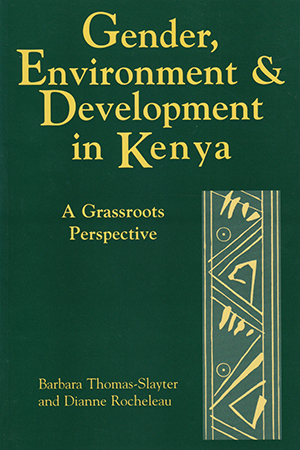Linkages among poverty, gender roles, resource decline, and ecological degradation challenge development policy and practice in many parts of the world. This book provides an analytical framework for understanding these linkages, then examines them empirically in six very differing communities in rural Kenya. The authors explore the ways in which community institutions, and specifically women and their organizations, respond to changing resource conditions. Looking at gender-based strategies for controlling such critical resources as soil, water, and woodlands, they consider the effects of these strategies on local decisionmaking, changing gender roles, rural stratification, and community relations within the broader social and political environment.
Barbara Thomas-Slayter is associate professor of international development and director of the International Development Program at Clark University. Her publications include Politics, Participation, and Poverty: Development Through Self-Help in Kenya. Dianne Rocheleau is associate professor of geography at Clark University. She has published extensively on women in development, farming systems, and agroforestry.
Choice Outstanding Academic Book
"...Provides much evidence for the ingenuity and determination and resourcefulness of women in the region, as in much of sub-Saharan Africa."—Environment and Politics
"An empirically rich study of rural livelihoods in six communities in Kenya.... Responding to the current theoretical emphasis on gender relations, local specificities, and responses in understanding how sustainable resource management strategies can emerge, this book makes a valuable contribution within the African context as it interweaves these theoretical concerns with a documentation of daily practices and the realities of male out-migration, agrarian change, and declining levels of health and nutrition.... The authors reveal why gender matters within the context of sustainable development."—Lucy Jarosz, The Professional Geographer
"Going far beyond frameworks that bemoan the invisibility of women in development, each of the essays successfully demonstrates the utility of gender analysis in understanding local ecological and institutional dynamics.... This book goes quite far in achieving complementarity between theory and local ecological and institutional realities, and I recommend it very highly."—Catherine Scott, Studies in Comparative International Development
"Thorough and insightful... May it be widely read..."—Nici Nelson, Journal of Developing Areas








